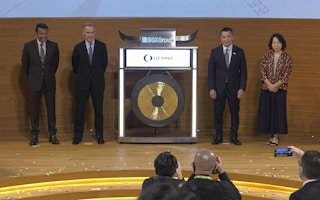A group of financial institutions working to slash emissions has launched an Asia Pacific network to promote green investment and push more businesses to adopt decarbonisation targets.
To continue reading, subscribe to Eco‑Business.
There's something for everyone. We offer a range of subscription plans.
- Access our stories and receive our Insights Weekly newsletter with the free EB Member plan.
- Unlock unlimited access to our content and archive with EB Circle.
- Publish your content with EB Premium.
The Glasgow Financial Alliance for Net Zero (GFANZ), set up in April last year and made up of over 450 banks, insurers and asset managers, opened its first regional office in Singapore on Wednesday. GFANZ members hold about US$130 trillion, or 40 per cent of global private assets.
Asia Pacific contributes to over half of global carbon emissions and is home to about 60 per cent of the world’s population. It is the most disaster-prone part of the world and is set to face stronger storms and more frequent flooding as global warming worsens.
About 50 GFANZ members are from the region as of end-2021. They hold about US$15 trillion in assets.
“What happens in Asia Pacific will determine whether the world succeeds,” said GFANZ co-chair Mark Carney at the launch of the Asia Pacific network at the Singapore stock exchange.
“
It is about transforming the existential risk of climate change into the greatest commercial opportunity of our time.
Mark Carney, co-chair, GFANZ
The group said it will push for more investment in low carbon and renewable energy in the region, to move it closer to net-zero emissions by 2050. The target is a key step to limiting global warming to under 1.5 degrees Celsius, a level scientists say helps prevent the worst effects of climate change.
Previous estimates put the amount needed for the Asia Pacific region this decade at US$13.6 trillion.
“Achieving net-zero is about getting capital to companies with solutions, with plans to drive emissions down,” said Carney.
“It is about transforming the existential risk of climate change into the greatest commercial opportunity of our time,” he added.
GFANZ added it will ask more firms in the region to set net-zero targets. As of last year, only 8 per cent of firms in Asia Pacific has some form of net-zero aims, according to CDP, a non-profit that helps firms disclose their environmental impact. All GFANZ members pledge to hit net-zero emissions by 2050.
The group’s Asia Pacific operations will be helmed by Yuki Yasui, who is also the Asia Pacific lead for a financial project run by the United Nations Environment Programme.
An advisory board headed by the chief of Singapore’s central bank Ravi Menon will provide guidance. The board also includes members from the Asia Development Bank, Asian Infrastructure Investment Bank and the United Nations.
Menon said he is looking forward to developing more green finance solutions in Asia, and working with other financial regulators to further the climate agenda.
“The key to addressing the tension between development and decarbonisation lies in credible and inclusive transition pathways, based on strong public private partnerships,” said Menon, adding that fossil fuels will continue to meet Asia’s energy demands, at least in the next few years.
“Transition plans should enable progressive decarbonisation that is aligned to net-zero goals while taking account of developmental needs and providing support for communities to pivot to new growth opportunities in a green economy,” he said.
GFANZ’s Singapore office is supported by the country’s central bank, stock exchange and Temasek, a state investment firm.
The financial coalition said it will launch regional networks in Africa and Latin America in the coming months.

















